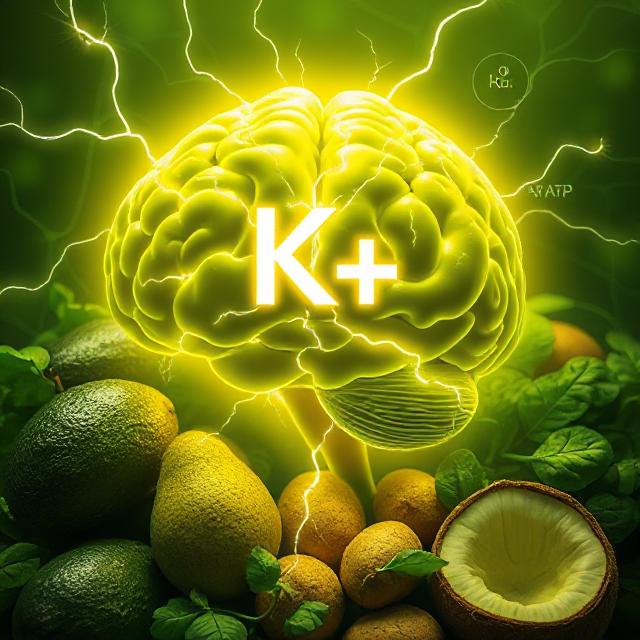
Table of Contents
Potassium as a Cognitive Fuel Booster
Potassium is often treated as a second-tier mineral—known more for preventing cramps than for fueling your mind. But this unassuming electrolyte plays a central role in brain energy, mental clarity, and cognitive function. If you’re chasing better focus, stable mood, or deeper learning, potassium may be the missing mineral in your strategy.
This article explores how potassium acts as a cognitive fuel booster, the science behind its effects on neurons and mental energy, and how to balance it with other key minerals for brain performance.
🧠 Potassium and Brain Function: The Basics
Every thought, memory, or decision you make relies on one thing: electrical signaling between neurons. Potassium is at the heart of this process.
How it works:
- Neurons fire through electrical gradients maintained by sodium and potassium ions.
- Potassium helps repolarize neurons after they fire, resetting them for the next signal.
- It works with sodium to create the action potential, the voltage spike that allows communication between brain cells.
- Without enough potassium, brain signals become slow, irregular, or inefficient.
In short, potassium keeps your neurons firing cleanly and quickly.
🔋 Potassium and Cellular Energy (ATP)
Cognitive fatigue often has less to do with willpower and more to do with mitochondrial function. Potassium is essential to energy metabolism on the cellular level.
- It supports the Na+/K+ ATPase pump, which uses ATP to move sodium and potassium in and out of cells.
- This pump accounts for up to 40% of the brain’s energy use at rest.
- Efficient potassium levels mean less energy wasted, more ATP reserved for deep thinking, memory consolidation, and learning.
Without enough potassium:
- Cells lose electrical potential.
- Brain fog sets in.
- Focus becomes effortful.
⚖️ Potassium vs Sodium: The Delicate Brain Balance
Sodium gets a lot of press—especially when it comes to hydration or electrolyte drinks. But in reality, sodium is the accelerator, and potassium is the brake.
- Sodium depolarizes neurons (excitatory)
- Potassium repolarizes them (stabilizing)
If sodium is high and potassium is low:
- You may feel wired but unproductive
- Brain signals become erratic
- You experience fatigue, mood swings, and even anxiety
Maintaining potassium-to-sodium balance is key to sustained mental clarity.
Optimal brain performance requires electrical rhythm—not just raw stimulation.
🧬 Potassium’s Role in Neurotransmitter Regulation
Potassium doesn’t just move charges. It also influences the release of neurotransmitters, including:
- Dopamine – linked to motivation and learning
- Serotonin – connected to mood and cognitive flexibility
- GABA – associated with calm focus and inhibition of distractions
Studies show that potassium deficiency impairs dopamine release and reduces synaptic plasticity—the foundation of learning and memory.
🩺 Symptoms of Low Potassium (Hypokalemia) That Impact Brain Function
Low potassium is more common than you think—especially among high-performers who sweat, fast, or use stimulants like caffeine.
Brain-related symptoms:
- Mental fatigue
- Brain fog
- Poor memory retention
- Depression or mood instability
- Muscle weakness (including eye and facial muscles used in focus)
Even mild potassium depletion can reduce your cognitive voltage, making it harder to think, focus, or stay resilient under stress.
🍌 Foods High in Potassium (and Why Bananas Aren’t Enough)
Most people think of bananas as the gold standard for potassium. They’re decent—but there are better sources:
Top potassium-rich foods:
- Avocados – ~975 mg per fruit
- White potatoes (with skin) – ~926 mg per medium potato
- Sweet potatoes – ~540 mg per cup
- Spinach – ~839 mg per cooked cup
- Coconut water – ~600 mg per cup
- Beet greens – ~1300 mg per cooked cup
- Beans, lentils, squash, mushrooms, yogurt
Adults need about 3,500–4,700 mg of potassium per day—and most fall short.
If your focus is faltering, increasing potassium-rich foods (with sodium moderation) could be the brain upgrade you’ve been missing.
🧪 Can You Supplement Potassium Safely?
The FDA limits over-the-counter potassium supplements to 99 mg per capsule due to potential heart risks if misused. That said, there are effective ways to boost your levels safely:
Safer options:
- Potassium citrate powder – mixed in water (start with <500 mg)
- Electrolyte mixes with balanced sodium and potassium
- Potassium-rich whole food smoothies
Important: People with kidney issues, heart conditions, or on diuretics should consult a doctor before supplementing potassium.
⏱️ When to Optimize Potassium for Mental Focus
For peak cognitive benefits, timing matters:
| Goal | When to Increase Potassium |
|---|---|
| Morning focus | Before or with breakfast (supports brain startup) |
| Post-workout recovery | Replenishes losses from sweat and supports calm focus |
| Midday fatigue | Alongside magnesium for stable mood and energy |
| During fasting | Helps maintain electrolyte balance and brain clarity |
⚙️ Potassium + Magnesium + Sodium: The Focus Stack
For best results, potassium should be viewed in context with other minerals:
- Magnesium supports potassium retention and prevents overexcitation.
- Sodium boosts hydration and supports nerve signal strength.
- The ideal ratio depends on your sweat rate, diet, and lifestyle—but aiming for more potassium than sodium is a good baseline.
Think of it as a neural orchestra—each mineral playing its part in synchrony.
✅ Final Takeaway: Potassium, the Overlooked Brain Fuel
If your brain feels foggy, distracted, or drained—check your electrolyte balance, not just your caffeine intake or sleep quality.
Potassium isn’t just about muscle function or fluid retention. It’s the key electrolyte for cognitive voltage, stable mood, and clear focus.
Optimize potassium. Balance your minerals. Power your mind.